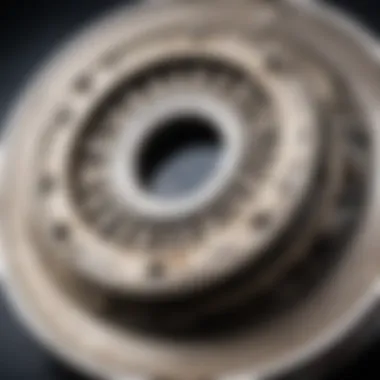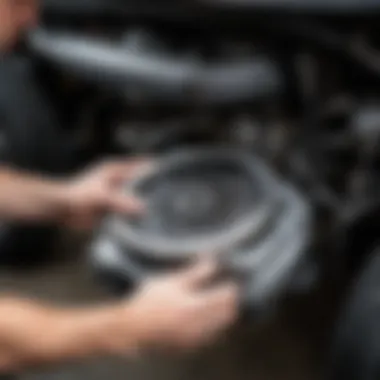Understanding Clutch Odors: A Detailed Guide


Intro
The world of automotive mechanics is diverse and intricate. The clutch system of a vehicle plays a vital role in its overall performance and functionality. While drivers frequently monitor the performance of their vehicles, they often overlook subtle cues that can indicate potential issues. One such cue is the distinct smell of an overheated or damaged clutch. Understanding this smell can be crucial for maintaining the health of a vehicle.
A comprehensive analysis of clutch odors can provide insights into underlying mechanical issues and preventive measures that can be taken. This article aims to dissect the various smells associated with vehicle clutches, exploring their causes, implications for performance, and maintenance tips that can ensure longevity and efficiency.
Обзор автомобиля
Основные характеристики
Vehicles today often come equipped with sophisticated clutch systems. These systems can vary significantly based on their design and the materials used in their construction. A typical clutch consists of a clutch disc, pressure plate, and flywheel, all working in tandem to disengage and engage the engine from the transmission smoothly.
The unique characteristics of clutches include:
- Type of Material: Common materials are organic, ceramic, and metallic. Each has its pros and cons in terms of heat resistance and durability.
- Clutch Engagement: This refers to the mechanism through which the clutch connects the engine to the drivetrain.
- Response Time: The ability of a clutch to engage and disengage affects drivability.
Описание двигателей и трансмиссий
Understanding the engine and transmission types is essential to grasp how the clutch influences vehicle performance. For example, manual transmissions rely heavily on clutch operation for seamless gear shifts. In contrast, automatic transmissions utilize torque converters, minimizing direct driver interaction with clutches.
The performance of a clutch system can be compromised if proper maintenance is neglected. Regular checks can help identify signs of wear or damage, preventing more severe issues that could result in loss of vehicle functionality.
Выбор автозапчастей
Разновидности запчастей
When it comes to replacing clutch components, various options are available. The choice of clutch parts can significantly affect vehicular performance and longevity. Drivers must consider:
- OEM vs. Aftermarket Parts: Original equipment manufacturer parts often guarantee compatibility and reliability, while aftermarket options may offer cost savings but variable quality.
- Clutch Kits: A complete kit usually includes all necessary components for a full replacement, ensuring that all related parts work closely together.
Как выбрать качественные запчасти
Choosing the right parts is critical. Here are some guidelines:
- Research Brands: Look for reputable manufacturers known for high-quality products.
- Read Reviews: Online platforms can provide useful insights from other consumers about their experiences with specific parts.
- Consult Professionals: Mechanics can provide expert advice on the most suitable products for specific vehicles.
"Maintaining a vehicle's clutch system is not just about performance; it can also prevent costly repairs down the line."
By understanding the significance of clutch odors and selecting high-quality parts, car owners can ensure optimal performance and longevity of their vehicles.
The intricate relationship between vehicle maintenance, including clutch care, and overall driving experience is underlined throughout this analysis.
Foreword to Clutch Smells
The topic of clutch smells is often overlooked by drivers. However, understanding these odors is crucial for vehicle maintenance. Clutches are vital for the operation of manual transmissions. Their condition directly affects vehicle performance and safety. Whether you are a casual driver or an automotive enthusiast, recognizing clutch smells can help identify underlying issues before they become significant problems.
Defining Clutch Smell
When discussing clutch smell, it refers to distinct odors that arise during the operation of a vehicle. These smells can result from several factors. Common odors include burning, sour, and chemical-like fragrances. Each variant signals different conditions. For instance, a burning smell usually indicates excessive friction. This can mean the clutch is overheating. It is important to be aware of these types of odors. They provide vital clues regarding the health of the clutch system.
Importance for Vehicle Maintenance
Understanding clutch smells plays a key role in vehicle upkeep. It enables car owners to monitor the condition of their clutches proactively. Being attentive to odors can lead to early detection of issues. Frequent smells such as burning may suggest frequent slipping or wear. This can cause significant damage to clutch components, which may require costly repairs. Recognizing these early signals can not only save money but can also improve the overall safety of the vehicle. Regular maintenance and inspection are crucial, as they help ensure optimal clutch performance and longevity.
"Monitoring the clutch's smell is as vital as checking the oil. Neglecting smells may lead to severe mechanical failures."
The Mechanics of Clutch Systems


Understanding the mechanics of clutch systems is crucial for recognizing how the performance of a vehicle can be directly influenced by the components and operation of the clutch. This section aims to dissect the intricate interplay of these systems, shedding light on the various elements at play and their significance in vehicle maintenance.
Components of the Clutch
The clutch system consists of several key components that work together to facilitate smooth gear shifting and overall vehicle control. The principal components include the clutch disc, pressure plate, flywheel, release bearing, and hydraulic or mechanical actuation systems. Each part plays a distinct role:
- Clutch Disc: This is the component that makes contact with both the flywheel and pressure plate, enabling motion transfer.
- Pressure Plate: It holds the clutch disc against the flywheel to engage the engine’s power.
- Flywheel: This component helps to maintain engine stability by storing rotational energy.
- Release Bearing: It disengages the clutch by pressing against the pressure plate when the clutch pedal is pressed.
- Actuation Mechanisms: These can be either hydraulic or mechanical, and they control the engagement and disengagement of the clutch.
Understanding these components is essential, as wear in any of them can lead to distinct smells, alerting drivers to potential issues.
How Clutch Operation Generates Smells
The operation of the clutch is tied to several factors that can produce smells during its normal function. When the clutch is engaged or disengaged, the friction between the clutch disc and pressure plate can generate heat. This heat is often a natural byproduct of normal operation; however, excessive friction can lead to burning smells, which serve as red flags for drivers.
Common scenarios that lead to odor generation include:
- Improper Engagement: If a driver excessively slips the clutch, this creates undue friction, generating heat and odor.
- Overheating: Prolonged use of a worn clutch can lead to overheating, emitting a burnt rubber or metallic smell.
- Material Composition: Certain materials, when heated, can emit distinct odors that signal wear or degradation.
"The smell associated with clutch systems often carries crucial information regarding their condition and functionality."
Recognizing these odors can empower vehicle owners to take timely action, preventing further damage to the clutch system and ensuring better driving performance.
Types of Odors Associated with Clutch
Understanding the types of odors associated with clutch systems is essential for car owners and mechanics alike. These smells provide valuable clues about the condition and performance of the clutch. Identifying specific odors can help in early diagnosis of potential issues, which may prevent costly repairs down the line.
Each type of odor serves as a signal for different underlying problems. This section will break down three main types of odors: burning smell, foul or sour odor, and chemical smells. By recognizing these smells, car owners can take appropriate action and maintain their vehicle effectively.
Burning Smell
A burning smell from the clutch is one of the most alarming indicators that something is wrong within the vehicle. This odor often suggests overheating, which can occur for several reasons. Common causes include the clutch being engaged too long during starts or stops and excessive ride on the clutch pedal.
The burning smell can be described as similar to burnt rubber or toast. It might mean the clutch friction material is wearing down, leading to potential damage to other components, such as the flywheel. If a burning smell is detected, it is imperative to:
- Pull over safely and inspect the vehicle
- Check the clutch fluid level
- Consider having it evaluated by a professional
Ignoring a burning smell can exacerbate the issue, leading to more severe damage and costly repairs.
Foul or Sour Odor
A foul or sour odor can be just as concerning as a burning smell. This type of odor usually indicates the presence of contaminants or substances that have interacted with the clutch components. This could be due to clutch fluid leakage or moisture intrusion.
The sour smell may remind one of vinegar or rotting eggs. If such a smell is present, it is beneficial to:
- Inspect for fluid leaks
- Check the condition of the clutch material
- Evaluate the vehicle's general health to avoid further combustion failure
This odor is often tied to an underlying issue that needs to be addressed promptly.
Chemical Smells
Chemical smells associated with clutch systems are less common but still warrant attention. Such odors can emerge from various sources, including overheating synthetic materials or the burnout of electrical components linked to the clutch operation.
The chemical odor can resemble burnt plastic or a sharp, acrid scent. In the presence of a chemical smell, car owners should:
- Stop operating the vehicle immediately
- Check for electrical issues or burnt components
- Seek professional diagnostics to ensure safety
These odors can point to critical problems that, if ignored, can lead to serious failures or safety hazards.


Causes Behind Unpleasant Clutch Odors
Understanding the causes behind unpleasant clutch odors is crucial for vehicle owners. The presence of abnormal smells can serve as an early warning system, indicating underlying issues that may lead to more severe problems over time. Addressing these smells promptly is not just about comfort; it directly affects the functionality and longevity of the clutch system and, by extension, the entire vehicle. Thus, recognizing and understanding these causes can significantly contribute to effective vehicle maintenance, ensuring that performance is not compromised.
Overheating Clutch
An overheating clutch is one of the primary culprits behind unpleasant smells. This issue often arises from excessive friction that produces heat, which can burn the clutch disc material. A common scenario includes drivers engaging the clutch while at a stop, particularly during hill starts or in stop-and-go traffic. As the clutch disc continues to slip, heat builds up. This overheating can lead to a very distinctive burning odor that signals that the clutch system is under severe strain. Moreover, prolonged overheating can warp the clutch components, necessitating more extensive repairs or replacements.
Worn Clutch Materials
Worn clutch materials are another significant cause of unpleasant odors. Over time, the friction materials used in clutches degrade due to repetitive use. When these materials wear down, the metal surfaces in contact can start to grind against one another. This can create a harsh, metallic smell and even lead to more serious clutch failure. Regular inspections can help identify when the materials are nearing the end of their lifespan. Many vehicles will show signs of wear through specific scents that are difficult to miss, making it essential to monitor them closely.
Improperly Adjusted Clutch
An improperly adjusted clutch can result in abnormal clutch smells due to the misalignment between clutch components. When the clutch is not correctly set, the release bearing may not fully disengage, causing excessive friction and heat generation. As a result, it may produce smells similar to those of an overheating clutch. Furthermore, improper adjustment can lead to erratic engagement and disengagement of the clutch, adding to the problem. A simple adjustment can often resolve this issue, but if ignored, the consequences can escalate.
Proper diagnosis of these causes can enhance not just the lifespan of the clutch system, but also the overall performance of the vehicle.
In summary, recognizing the triggers of unpleasant clutch odors—overheating, worn materials, and improper adjustments—can provide vehicle owners with critical insights into their vehicle’s health. Addressing these factors promptly is essential in maintaining optimal clutch function and ensuring a smoother driving experience.
The Impact of Clutch Smells on Vehicle Performance
The smell emanating from a clutch system can reveal much about its current state and functionality. Understanding these odors is crucial for vehicle performance and longevity. If neglected, minor issues indicated by unusual smells can escalate into major mechanical failures. This section explores how clutch smells affect not only the operation of the clutch but also the overall health of the vehicle.
Effects on Shift Quality
The quality of gear shifts is directly influenced by the condition of the clutch. If the clutch operates correctly, shifting should be smooth and effortless. However, unpleasant smells such as burning rubber or sour odors might indicate underlying problems. These smells often arise from a slipping clutch or excessive heat production during operation.
- Burning Smell: A burning odor typically signifies that the clutch is overheating. This overheated state can cause friction disc wear, leading to poor engagement and disengagement. As a result, drivers may face difficulties when trying to shift gears. It becomes harder to change from one gear to another, ultimately compromising the driver’s control and safety.
- Foul Odor: Sour smells may be a symptom of oil contamination. If oil leaks onto the clutch, it can severely hinder friction and cause delays or jerks during shifting. This concern needs immediate attention as it contributes significantly to a decline in shift quality.
Recognizing these signs early on can prevent further wear and ensure a smoother driving experience. Properly functioning clutches lead to enhanced driving comfort and vehicle performance.
Potential Damage to the Transmission
Smells from the clutch do not only affect shifting quality; they might also have broader implications for the transmission system. A degraded clutch can lead to a series of mechanical failures that result in costly repairs.
- Slipping Clutch: When clutch smells indicate excessive slipping, it mainly points to insufficient pressure within the system. This phenomenon can wear down not only the clutch components but may also transfer excessive strain to the transmission. Over time, this may cause damaged gears or even a total failure of the transmission system.
- Heat Damage: From overheating, clutch components may warp or change shape. Such deformation may create misalignment in the transmission, leading to knocking or grinding noises. Affected vehicles will exhibit poor performance, with drivers facing potential acceleration delays.
Understanding these dynamics is essential for maintaining vehicle efficiency. Regular inspections and adherence to maintenance practices can alleviate these potential risks and prolong the life of both clutch and transmission systems.
Diagnosing Clutch Issues via Smell
Diagnosing clutch issues through smell is a crucial aspect of vehicle maintenance that can potentially save car owners significant time and repair costs. Understanding the odors emitted by a malfunctioning clutch allows drivers to identify problems early. This proactive approach not only helps in preventing further damage but also enhances overall vehicle performance.
When a clutch system begins to fail, it often sends out distinct odors that serve as warning signs. Recognizing these smells can guide a driver in determining whether to continue operating the vehicle or seek professional assistance. This section discusses two fundamental components: recognizing distinct odors and evaluating whether to attempt diagnostics personally or rely on professional expertise.
Recognizing Distinct Odors
Car owners must learn how to distinguish between different clutch odors. Each scent can indicate specific issues:
- Burning Smell: Often points to overheating or excessive friction. It suggests that the clutch is slipping or not fully engaging. If this scent persists, it may lead to severe damage.
- Foul or Sour Odor: This unpleasant odor often signals the presence of oil or fluid leaks. A sour smell can also result from worn-out clutch components, suggesting severe wear and tear.
- Chemical Smells: Unusual chemical odors might be due to degraded materials within the clutch system. This can indicate the breakdown of the clutch disc or the pressure plate.
Being aware of these smells is essential. For instance, recognizing a burning smell early can prevent extensive transmission damage. It is advisable not to ignore these signs, as they can escalate into more serious issues.
Professional Evaluation vs. DIY Diagnostics
While some drivers may feel equipped to handle diagnostics on their own, others may prefer seeking professional help. Here are considerations for both approaches:


- DIY Diagnostics: Recognizing smells and understanding their implications can empower some vehicle owners. Researching common symptoms online and consulting forums, such as those found on reddit.com, can help inform one’s understanding. Those comfortable with mechanical aspects may attempt basic evaluations.
- Professional Evaluation: For less experienced drivers, consulting a mechanic may be the safest option. Trained professionals have extensive knowledge and tools to assess clutch issues accurately. They can provide a thorough inspection and recommend appropriate solutions.
Ultimately, the decision between DIY diagnostics and professional evaluation hinges on the driver’s comfort level with mechanical issues. Engaging with mechanics who can tackle clutch diagnostics is often wise.
Knowing how to diagnose clutch problems using smell is important. It can prevent costly repairs and maintain performance.
Through understanding the distinct odors associated with clutch systems and weighing the options for professional assistance, vehicle owners can make informed decisions that promote longevity and efficiency in their vehicle's clutch operation.
Preventive Measures and Maintenance Tips
Maintaining a healthy clutch is essential for optimal vehicle performance. Recognizing and addressing potential issues can prevent costly repairs and enhance the longevity of the clutch system. Preventive measures help ensure drivers do not experience unpleasant odors associated with clutch problems while aiding in the overall safety and reliability of their vehicles.
Regular Inspection of Clutch Components
Regular inspections of clutch components are a crucial preventive measure. Checking the clutch system not only safeguards against unexpected failures but also allows early detection of wear and damage. Components such as the clutch disc, pressure plate, and release bearing should be examined closely.
- Clutch Disc: This part experiences significant friction. Inspecting for signs of wear ensures effective operation.
- Pressure Plate: A damaged pressure plate can cause engagement problems. Maintaining its integrity is vital.
- Release Bearing: This component should be free from abnormal noises. Any signs of wear should prompt immediate inspection.
Moreover, lubricating moving parts helps prevent sticking, which can lead to overheating. Engaging a mechanic for a thorough inspection every few thousand miles is recommended, especially in vehicles used in demanding conditions.
Guidelines for Proper Clutch Use
Proper clutch use is as important as inspection. Adopting best practices can greatly reduce the chances of developing unpleasant odors or damaging the clutch system.
- Avoid Riding the Clutch: Keeping your foot on the clutch pedal while driving causes unnecessary wear. Use the clutch only when necessary.
- Downshift Appropriately: Learn to change gears effectively. Downshifting without excessive force can prolong clutch life.
- Gradual Engagement: Apply the clutch smoothly when starting and stopping. Sudden movements can induce a burning smell due to excess friction.
Implementing these guidelines contributes to smoother operation and minimizes the risk of issues. Proper care and knowledgeable usage will ensure the clutch system functions as it should, extending its service life.
"The key to effective clutch maintenance is being proactive, rather than reactive. Consistent checks and mindful operating can save substantial costs in repair."
Combining regular inspections with practical usage strategies not only prevents unpleasant smells but also enhances overall vehicle performance, ensuring a safer driving experience.
When to Seek Professional Help
In the realm of vehicle maintenance, addressing clutch-related issues is crucial for safe driving and optimal performance. When discerning the nuances of clutch smell, it is equally important to recognize when professional intervention is necessary. The consequences of neglecting serious clutch problems can lead to catastrophic failures, impacting both your vehicle and safety on the road.
Signs of Serious Clutch Problems
Identifying the warning signs of clutch issues can be deceptively simple yet critical. Here are key indicators that warrant immediate professional assistance:
- Persistent Unpleasant Smells: A consistent burning or foul odor that does not dissipate indicates a potential clutch failure or overheating. These smells could signify that the clutch friction material is deteriorating beyond acceptable limits.
- Difficulty Shifting Gears: If you experience grinding or hesitation in shifting gears, the clutch could be failing. This happens when the clutch is not fully disengaging from the flywheel, which can lead to increased wear and damage.
- Unusual Vibrations or Noise: Any abnormal sounds, such as grinding or squeaking, during operation may suggest that components are misaligned or damaged. Such noise should not be ignored as it can amplify into more severe problems.
- Fluid Leaks: Leaking transmission fluid near the clutch area could mean severe damage. This fluid is essential to ensure smooth operation and protect parts from excessive wear.
- Slipping Clutch: If the engine revs but the vehicle does not accelerate as expected, this is a sign the clutch is slipping. It may indicate worn friction material, which requires immediate repair.
Understanding Repair Implications
When clutch problems arise, understanding the implications of repair is paramount. Engaging a professional to handle these issues is beneficial for several reasons:
- Expert Diagnosis: Professionals can accurately diagnose the problems, spotting underlying issues that may not be immediately evident to the untrained eye. They have the tools and experience necessary to assess the full extent of the damage.
- Quality Repairs: Professional mechanics utilize high-quality parts and follow best practices, ensuring that repairs are done correctly and last longer. DIY fixes could lead to further complications if not performed correctly.
- Warranty Considerations: Many repairs come with warranties, providing peace of mind after service. This is especially important for expensive repairs where further issues could lead to significant costs if not correctly addressed.
- Comprehensive Service: Mechanics often perform a thorough inspection of related systems during clutch repair. This can save time and money by addressing multiple issues in one visit, leading to improved vehicle performance overall.
In summary, recognizing signs of serious clutch problems and understanding repair implications are integral to maintaining vehicle functionality and safety. When in doubt, seeking professional help can save drivers from future headaches.
Epilogue
The significance of understanding the characteristics and implications of clutch smells cannot be overstated. In this article, we have examined various aspects of clutch systems, from their mechanics to the odors associated with malfunctioning components. Recognizing these smells is crucial for vehicle maintenance and performance enhancement.
Recap of Key Points
Several critical points have been discussed:
- Defining Clutch Smell: We described the various odors, including burning, sour, and chemical smells, which indicate different problems within the clutch system.
- Diagnosing Issues: Identifying distinct smells can give insights into clutch conditions, allowing for timely interventions.
- Impact on Performance: Understanding how clutch smells relate to shift quality and potential transmission damage highlights the need for early diagnosis.
- Maintenance Tips: Regular inspections and proper usage guidelines are fundamental for extending the life of the clutch and preventing unpleasant odors.
- Seeking Professional Help: Knowing when to consult a mechanic is essential to avoid more severe issues and costly repairs.
Final Thoughts on Clutch Care
In summarizing, effective clutch care involves vigilant observation of symptoms, especially unusual smells. Proper usage and maintenance practices can significantly contribute to the longevity and performance of a vehicle's clutch system. By understanding how smell relates to mechanical performance, drivers can take proactive steps to ensure their vehicles operate in optimal condition. This knowledge not only enhances the driver experience but also promotes safer roads as well.
Investing time in understanding vehicle components leads to better maintenance decisions and ultimately longer vehicle life.







